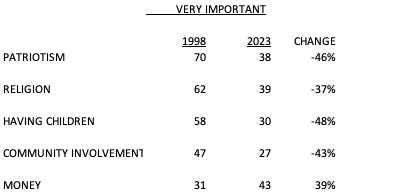I’m a numbers guy, and I get upset when I see that numbers are not fairly represented. (I also get upset when I hear the phrase “very unique,” but therapy is helping me with that.)
A recent Wall Street Journal article about the plummeting decline in American values is making the rounds. It’s based on three consistently worded polls conducted in 1998, 2019, and 2023. The article showcases a scary group of charts tracking over time what percentage of respondents thought five key values were very important. All the “positive” values declined significantly, except for money, which went up. And only a minority of respondents said that any of the five values were very important to them.
Here are the numbers as presented by the article.
The thrust of the article is that the majority of Americans have become a bunch of money-grubbing heathens uninterested in country, posterity, or community.
But here’s the problem with the showcased numbers above. I looked at the actual polls and the respondents were given the following choices about how important these values were to them.
1) Very Important
2) Somewhat Important
3) Not That Important
4) Not Important At All
What the pollsters themselves highlight in bold is the combined percentage of respondents answering either Very Important or Somewhat Important. The pollsters bolded it because that was the statistic they thought was the most relevant, although it did not make for nearly as dramatic a chart or news story.
So, here is the same table as above, but using the pollsters’ preferred methodology.
Admittedly, the trends in the four “positive values” are still down significantly over the past 15 years. But, instead of a minority of respondents attaching importance to these four values, we see instead a clear majority doing so, ranging from 60% to 80%. As for money, the root of all evil, the combined percentage has barely budged.
I understand why the WSJ reported it the way it did. But in doing so, it effectively bamboozled its readership.





Breaking my commenting break here as I think this is very important, that when we add "somewhat important" the numbers aren't as horrible as when we don't.
Unfortunately Ruffini's attempt to debunk the article, actually made for an even more depressing conclusion than the WSJ presentation. Because according to him, the main reason for the sudden drop is because prior versions of the poll were conducted by phone, but the most recent one was online, and the phone version was likely affected by "social desirability bias".
So he thinks basically that Americans have been money-grubbing heathens for years and just lying to pollsters on the phone that they actually cared about community, religion, or having kids, because that's what they assumed they were *supposed* to care about.
Sure, he gives some lip service to not trusting the poll at all, because it's an outlier. But his article basically concludes "ackshually what's really going on is even WORSE, we didn't suddenly become money-grubbing heathens, we have been like that for YEARS"!
So I was a tad bummed that TMD provided a link to it. As it just seems to be more evidence that TD has ditched a big part of their corporate brand, which was the whole idea of steelmanning the opposition and assuming good faith.
But it seems many at TD are now falling into a mentality that everyone on all sides is at best selfish, or at worst evil, and assuming BAD faith.
The articles there used to have more of a Happy Warrior Remnant vibe. Now many have a weary, cynical vibe that gives me the impression of "the world is going to hell in a handbasket, all our institutions are crumbling or burning up, while politicians fiddle and preen for the cameras, and no one really cares, so we are just doomed, doomed, Doomed".
Then there's their new YouTube channel that is apparently totally exempt from Steve's anti-clickbait policy. So I assume it's only a matter of time before that approach to marketing, infects the main site, too.
All that being said, I haven't totally given up on TD. But in general it's become much more negative a place than 3 years ago, and I think the comments reflect that. I was initially planning on returning to TD comments after Easter, but now I am not so sure.
Excellent analysis but very disturbing.
How about submitting a letter to the WSJ:
https://www.wsj.com/articles/letter-to-the-editor-wsj-how-to-submit-wall-street-journal-guidelines-11647960749